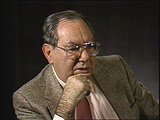

We got to Majdanek was in, in July, I think in August, 1943. We were standing in a ditch and digging, and my father was standing next to me. A Pole passes by, grabs a stone and throws it onto my father. And he was a prisoner too, you know. The stone hit his leg. I don't know what happened, if he broke a bone or something happened. He couldn't walk. In the night when we went home to the barracks, he couldn't walk. He had to hold me here, like this, and, and somehow we dragged him, me and that friend, we dragged him in the barrack. He was laying down. And his foot swelled up like this. All of a sudden it swelled up. So one guy said we should go and call a medic or a doctor or somebody. Over there, they used to call a 'Sanitaer.' Well, I didn't realize what's going to happen if somebody gets sick. I didn't realize it. I thought, well, when a man he got sick, something like this, that medic came. He wore a red cross. He came. He took my father. He says to him, "You know what, you have to go on 'Revier.'" 'Revier' means the hospital. And he took him away. And he says tomorrow he's going to bring him back. I never saw my father anymore. And he, this is for no reason at all. Pick up a stone and throw on somebody. And he was...he was just standing there. The stone could have hit me, but it hit him.
We got to Majdanek was in, in July, I think in August, 1943. We were standing in a ditch and digging, and my father was standing next to me. A Pole passes by, grabs a stone and throws it onto my father. And he was a prisoner too, you know. The stone hit his leg. I don't know what happened, if he broke a bone or something happened. He couldn't walk. In the night when we went home to the barracks, he couldn't walk. He had to hold me here, like this, and, and somehow we dragged him, me and that friend, we dragged him in the barrack. He was laying down. And his foot swelled up like this. All of a sudden it swelled up. So one guy said we should go and call a medic or a doctor or somebody. Over there, they used to call a 'Sanitaer.' Well, I didn't realize what's going to happen if somebody gets sick. I didn't realize it. I thought, well, when a man he got sick, something like this, that medic came. He wore a red cross. He came. He took my father. He says to him, "You know what, you have to go on 'Revier.'" 'Revier' means the hospital. And he took him away. And he says tomorrow he's going to bring him back. I never saw my father anymore. And he, this is for no reason at all. Pick up a stone and throw on somebody. And he was...he was just standing there. The stone could have hit me, but it hit him.
Describes father's death at Majdanek
[Interview: 1989]
Like other Jews, the Lewents were confined to the Warsaw ghetto. In 1942, as Abraham hid in a crawl space, the Germans seized his mother and sisters in a raid. They perished. He was deployed for forced labor nearby, but escaped to return to his father in the ghetto. In 1943, the two were deported to Majdanek, where Abraham's father died. Abraham later was sent to Skarzysko, Buchenwald, Schlieben, Bisingen, and Dachau. US troops liberated Abraham as the Germans evacuated prisoners.
— US Holocaust Memorial Museum - Collections
Lublin/Majdanek Concentration Camp: Conditions »